The Turkish newspaper Cumhuriyet reported on Tuesday that police in the southern city of Mersin had arrested a 16-year-old boy on charges of “insulting the president,” a crime in Turkey, for drawing a Hitler mustache on a poster of strongman Recep Tayyip Erdoğan.
The incident reportedly involved one of several Erdoğan posters adorning the city in the aftermath of last month’s presidential election. According to Cumhuriyet, police found a poster with insults scribbled on it and Erdoğan sporting a Hitler mustache. Using surveillance footage, law enforcement officers identified the culprit as the 16-year-old. The child admitted to drawing the mustache but said he did not write the insults, suggesting someone else had added them later. Police detained him in a juvenile facility.
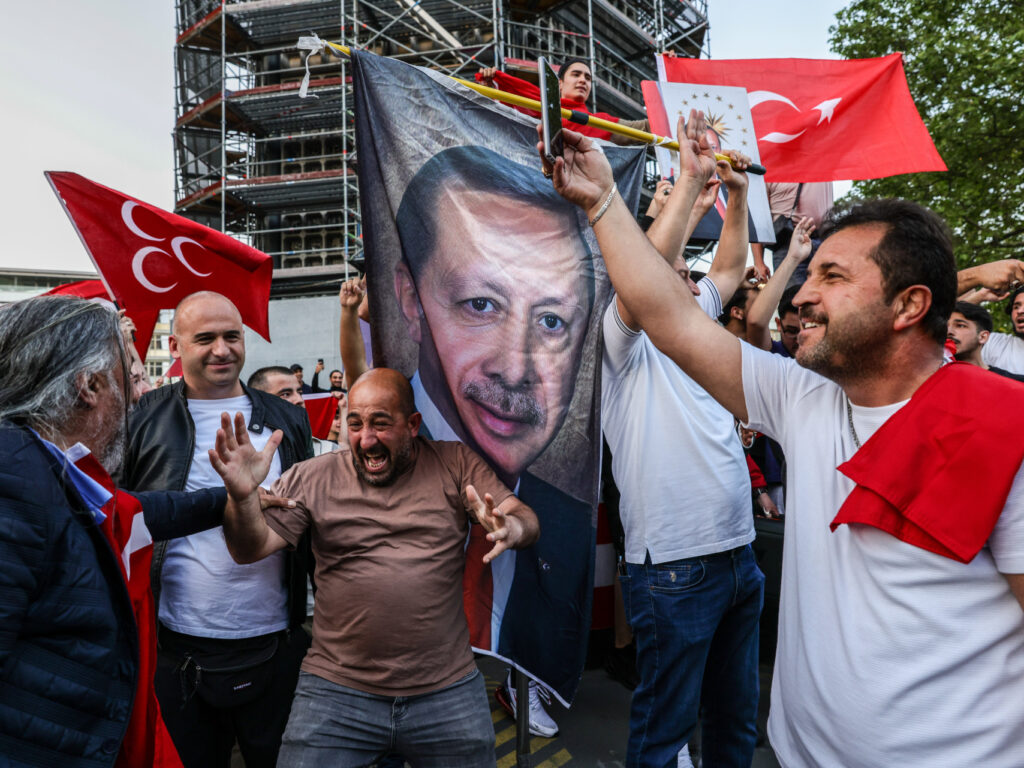
Local Turkish people celebrate along the Kurfürstendamm avenue, the preliminary results in Turkey’s general election run-off that indicate a win for Recep Tayyip Erdogan on May 28, 2023, in Berlin, Germany. (Omer Messinger/Getty Images)
Turkey does not formally have laws protecting free speech. On the contrary, the Turkish penal code specifically punishes insults against Erdoğan (or anyone holding the office of the presidency) and Mustafa Kemal Atatürk, the founder of the Republic of Turkey. “Insulting the president” is one of the most commonly prosecuted crimes in Turkey, punishable by up to four years in prison for individuals found guilty of insulting Erdoğan in private or among friends. Judges may increase the sentence if the insults were broadcast on television or propagated on a larger scale in other forms.
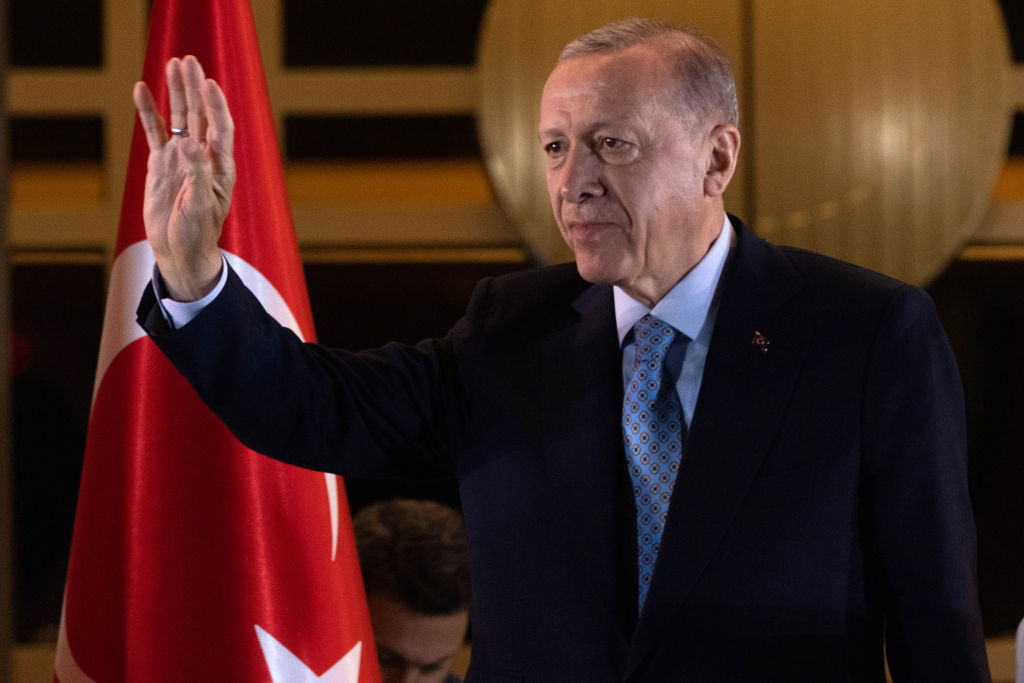
President Recep Tayyip Erdogan acknowledges supporters at the presidential palace after winning reelection in a runoff on May 29, 2023 in Ankara, Turkey. (Chris McGrath/Getty Images)
Erdoğan’s presidency has been particularly prolific in prosecuting individuals for perceived or real insults, including victims as young as 13 years old. The high school student arrested this week is the most high-profile case of a child arrest related to the law since Erdoğan “won” the presidency in a May 28 election that secular opposition leaders denounced as violence-ridden and highly unfair. His opponent, the head of the Republican People’s Party (CHP) Kemal Kılıçdaroğlu, has been the subject of several police investigations on charges of insulting the president. He promised to repeal the law if elected. The CHP was founded by Atatürk himself, who Erdoğan has insulted publicly without consequence.
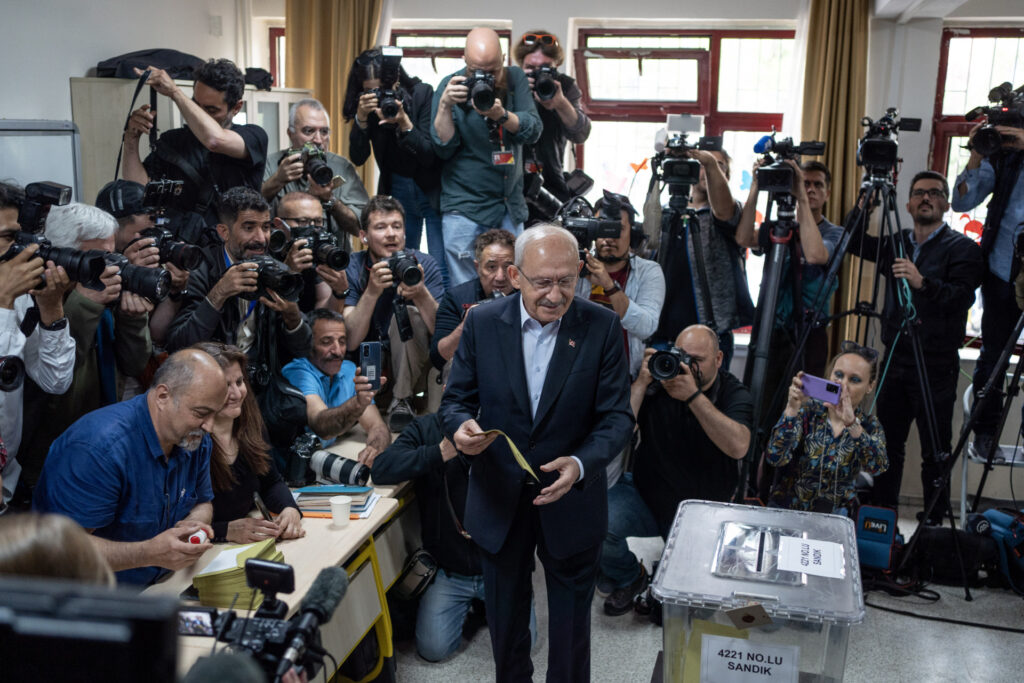
Kemal Kilicdaroglu, presidential candidate and leader of the Republican People’s Party (CHP), prepares to cast his vote at a polling station in Ankara, Turkey, on Sunday, May 28, 2023. (Moe Zoyari/Bloomberg via Getty Images)
The 16-year-old in Mersin is the first such case in June to make headlines. A month ago, in between the first round of presidential voting on May 13 and the second on the 28th, Turkish police arrested a 13-year-old boy, identified in the press by his initials B.C.G., for allegedly insulting Erdoğan in a Whatsapp group. One of the members of the private group chat reported the boy to local police in Istanbul.
“B.C.G. said in his defense in court that he did not intend to insult the president on social media but rather had criticized other group members who had made anti-democratic comments,” the Stockholm Center for Freedom (SCF), which documents human rights abuses in Turkey, reported last month.
Such arrests are common. Full-scale investigations into individuals for alleged insults are less common, but nonetheless pervasive – the SCF noted that prosecutors opened 7,600 such probes in 2022 alone and, under Erdoğan as president, over 160,000 people have been the targets of such investigations. Erdoğan has served as president since 2014 but previously held the title of prime minister; his “election” last month will allow him to enter a third decade in power.
Police action against civilians for allegedly insulting the president escalated greatly in 2014. A year after Erdoğan became president, Turkey attracted international attention by prosecuting a Turkish doctor, Bilgin Ciftci, for posting a meme on social media comparing the president to Gollum, the Lord of the Rings character. The trial required multiple expert witnesses to explain whether comparisons to Gollum were inherently insulting. The director of the Lord of the Rings films, Peter Jackson, weighed in to argue that the photos in the meme showed Smeagol, the uncorrupted version of Gollum in the books, and not the nefarious character, and therefore the images were not insulting. The judge in the case acquitted Ciftci in 2017.
Others were not so lucky. In 2018, Turkish singer Zuhal Olcay was sentenced to ten months in prison for singing a version of one of her songs at a concern with the lyrics rewritten to attack the president.
“Recep Tayyip Erdoğan, it’s all empty, it’s all a lie, life will end one day and you’ll say ‘I had a dream,” the live version of Olcay’s song “I Let Go of the World” said.
Erdoğan escalated prosecutions of “insults” against him after offering an “amnesty” in 2016, shortly after the July 15 alleged failed coup against him. At the time, reports indicated that the amnesty would benefit hundreds of people.
“For one time only, I will be forgiving and withdrawing all cases against the many disrespects and insults that have been levelled against me,” the president said, hoping the amnesty would compel Turks to “behave accordingly.”
Many did not do so. Later that year, police arrested the cook who worked the cafeteria at Cumhuriyet‘s offices, Şenol Buran, for saying of Erdoğan, “I would not serve that man a cup of tea.”
Cumhuriyet lost some of its top leadership – former editor-in-chief Can Dündar and Ankara bureau chief Erdem Gül – after the two were arrested for a report claiming the Turkish government was arming anti-Assad jihadist forces in Syria. Dündar was sentenced to 27 years in prison for the report and fled to Germany; an assailant attempted to shoot him dead at the courthouse during a recess at his trial. Gül was acquitted and currently serves as mayor of Princes Islands, Istanbul province.
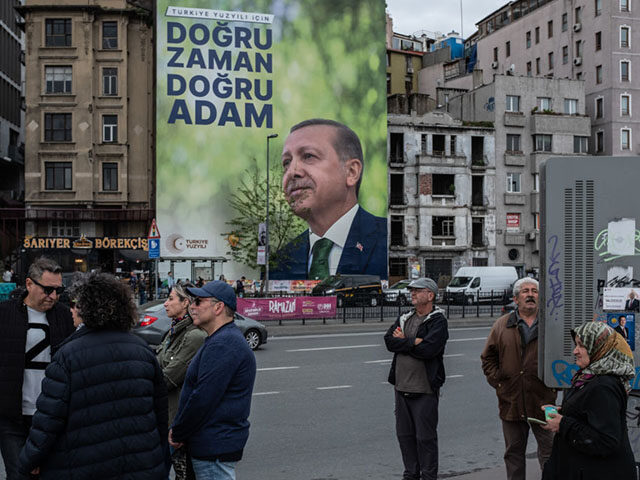
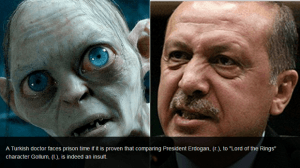
COMMENTS
Please let us know if you're having issues with commenting.